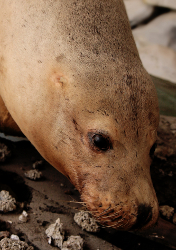Analysis Shows Namibia's Seals are Worth More Alive Than Dead
 A new comprehensive study on "The Economics of Seal Hunting and Seal Watching in Namibia," commissioned by several international animal welfare organizations, demonstrates that seals are worth far more alive than dead. Comparing the most recent figures available for both industries, the report concludes that the annual Namibian seal slaughter poses a major risk to the far more lucrative seal-watching tourism industry.
A new comprehensive study on "The Economics of Seal Hunting and Seal Watching in Namibia," commissioned by several international animal welfare organizations, demonstrates that seals are worth far more alive than dead. Comparing the most recent figures available for both industries, the report concludes that the annual Namibian seal slaughter poses a major risk to the far more lucrative seal-watching tourism industry.
The report was commissioned by Bont voor Dieren (BvD), Humane Society International (HSI), Respect for Animals (RFA) and the World Society for the Protection of Animals (WSPA), and produced by the Australia-based independent economics consultancy Economists at Large. It reveals that, in 2008, the seal hunt generated only $513,000 – a poor comparison to seal-watching, which netted $2 million in direct tourism expenditure in the same period.
"Each year, up to 85,000 seals are killed in Namibia to make just a few dollars from their furs, when they would be worth so much more to the Namibian economy alive," said Claire Bass, WSPA International oceans campaign leader. "Eco-tourism is a growing part of Namibia's identity, but tourists will be shocked to learn that a seal they photograph one day may be clubbed to death the next morning. There is a clear economic case for the government to protect these animals."
WSPA Celebrity Ambassador Leona Lewis added: "No price would ever be high enough to justify the killing of these harmless animals. This country has so much natural beauty to offer tourists. Why allow this brutal practice to tarnish its reputation forever?"
The report provides detailed insight into the seal slaughter by examining the monetary benefits attached to each part of the trade. Bull seals account for a large proportion of the profits, as their genitals are sold in Asian markets for alleged aphrodisiac qualities, for approximately $62 per pound. Seal pups are killed for their fur, with each pelt sold for as little as $5.70. Aside from the low income netted by the seal slaughter, the practice poses a real threat to the far more lucrative seal-watching industry, because large-scale killing could lead to a collapse of seal populations, as witnessed in the 1990s.
"Each year in Namibia, nursing baby seals are forcibly separated from their anguished mothers and beaten and stabbed to death for their fur," said Rebecca Aldworth, executive director of Humane Society International/Canada. "Fortunately, this report confirms that seal-watching has the potential to contribute far more to Namibia's economy than this outdated slaughter ever could. We urge the government of Namibia to act in the best interests of its citizens, and the seals, by ending the slaughter forever."
Seal watching, in contrast, is a popular tourism activity undertaken by about 10 percent of tourists to Namibia, which was just over 100,000 in 2008. Based on current growth trends, the report predicts that by 2016, as many as 175,000 tourists to Namibia will participate in seal-watching, generating more than $3.2 million in direct revenues. Seal-watching also delivers benefits to a far wider range of Namibian society than seal killing, helping boost tourism support services such as hotels and restaurants.
Strangely enough, seal-watching takes place on the very same beaches where killings are allowed: Cape Cross, Atlas Bay and Wolf Bay. During the hunting season, from July 1 to Nov. 15, hundreds of baby seals are clubbed every day between dawn and 8 a.m. at Cape Cross, a "Seal Reserve." At 10 a.m., the same beach opens to hundreds of tourists as a seal-watching attraction.
The hunts have been deliberately hidden from tourists' view for years. However, as they become increasingly exposed via the media and Internet, there's a significant risk that wildlife-loving tourists will not want to visit these doomed seals during their vacations, which would be disastrous for Namibian eco-tour companies.
"The Namibian seal hunt is clearly not sustainable. This report points to eco tourism as a long-term and highly consistent way forward for this beautiful part of the world," said Mark Glover, director of Respect for Animals.
"The Namibian seal hunt is a well kept secret for tourists and it's time to change that," added Nicole van Gemert, director of Bont voor Dieren (NL). "Especially from the Netherlands, there are many tourists going to Namibia each year. If they found out about the slaughter that takes place each day before the beaches open for seal watching, they won't be so eager anymore. We urge the government to read this report and then look again at its sealing policy."